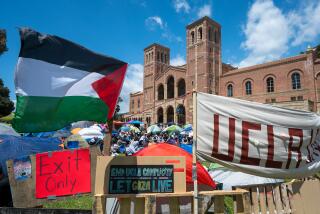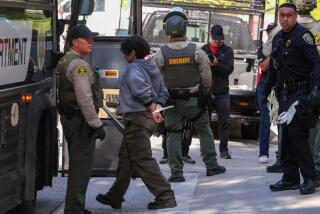Judge Bars LAPD From Preempting Protest Activities
- Share via
A federal judge on Friday barred the Los Angeles Police Department from using some of the proactive tactics that police in Philadelphia employed against protesters during the Republican National Convention.
U.S. District Judge Dean E. Pregerson ordered the LAPD not to seize any puppets or written material from the headquarters building used by people planning protests at the Democratic National Convention.
The judge also ruled that the police cannot enter the protest center to investigate alleged building and safety or fire code violations without a federal court order, unless there is an emergency.
However, Pregerson denied the protesters’ request that he order the police to halt their surveillance at the protesters’ MacArthur Park-area Convergence Center.
Though they did not obtain as broad a ruling as they sought, attorneys for the activists said they were very pleased with Pregerson’s order.
“We’re delighted with the judge’s injunction. It is critical to our client’s interests,” said attorney Carol A. Sobel.
“It also sends a message that the Constitution won’t be suspended during the convention,” said her co-counsel, Daniel P. Tokaji, a staff lawyer for the American Civil Liberties Union of Southern California.
Deputy City Atty. Debra Gonzales said the restrictions imposed by the judge present no problems for the police. “He still gives us the ability to get search warrants, make arrests” and conduct surveillance, she said. “He hasn’t tied our hands.”
And Cmdr. Tom Lorenzen, who heads the LAPD’s convention planning unit, said he was not alarmed by Pregerson’s decision. He would not say, however, whether police ever intended to search the Convergence Center or whether officers had planned to target the group’s organizers for arrests before protest marches begin.
Earlier, LAPD officials expressed admiration for the tactics used by the Philadelphia Police Department, which they watched firsthand as part of their preparation for the Democratic convention. Some of those tactics--including raids, seizure of protest materials and the arrests of leading activists--precipitated the filing of federal civil rights lawsuits now pending.
Pregerson acted in response to a suit filed Thursday, alleging that the LAPD had violated activists’ 1st Amendment rights and conducted a campaign of “unlawful harassment” of individuals gathered at the Convergence Center to plan protests during the upcoming convention.
Indeed, Pregerson said in court that the plaintiffs’ attorneys had produced evidence that, if true, showed that civil rights violations already have occurred.
In addition, LAPD Capt. Michael R. Moore, the new commander of the Rampart Division, said in a sworn declaration filed Friday that if one of the allegations made in the plaintiffs’ suit was accurate it represented police misconduct. And Moore said he already has ordered an internal affairs investigation of the incident, which involved LAPD officers’ temporarily taking into custody two women after they left the Convergence Center on Wednesday night.
One of the women was cited for jaywalking, even though, according to her account, she only stepped off a curb and then immediately returned to the sidewalk. The other woman was released without any charges being filed against her. Both women were handcuffed. They said they had been treated abusively by the officers who took them to the Rampart station.
In a court declaration filed Thursday, protest organizer Lisa Fithian expressed particular concern that the LAPD might seize puppets from the center, just as the Philadelphia police confiscated and destroyed puppets at a similar protest center during the Republican National Convention earlier this month.
Colorful handmade puppets have become ubiquitous props in demonstrations around the country. They first drew wide notice during the anti-globalization protests at the World Trade Organization conference in Seattle last year.
Gonzales, the deputy city attorney, said in court Friday that the police had no intention of seizing any puppets, as long as they were just that--puppets and not illegal weapons in disguise.
Sobel reiterated in court Friday a point that the plaintiffs stressed in their papers: that people making puppets at the center had been given a copy of the Los Angeles Municipal Code regulating the thickness of wood that can be used in any object displayed during a demonstration.
Pregerson said that if the city had no intention of confiscating any puppets, he could see no reason why the city would object to an order prohibiting police from doing so.
At that point, Gonzales said the city had no problem with such an order “if the puppet is a puppet and not something illegal.”
Pregerson responded: “If there’s something criminal, you can apply for a search warrant.”
The plaintiffs also objected to a July 15 search of the center by police and fire officials, claiming that it was meant to interfere with the protest activities taking place there. But Gonzales said the officers went to the center for a trespassing investigation.
The deputy city attorney said that an LAPD officer had thought it was suspicious that there were people in the building because it had been vacant for several years. “She also saw several cars with out-of-state license plates parked near the building, which caused her to believe that the people she saw in the building might be trespassing.”
Sobel took issue with that statement, contending that by the time the officers entered the building, they knew that the protesters were lawfully occupying it.
In any case, Pregerson ultimately ruled that Los Angeles officials cannot enter the center “on the basis of purported administrative violations, including building and safety, zoning and fire code violations, in the absence of a prior order issued by this court.”
He also said, “nothing in this order is intended to preclude [police] from entering the Convergence Center or conducting any other activity pursuant to a warrant . . . or through other legal means.”
At one point, Pregerson said that the plaintiffs had asked for a very broad injunction, which also would have prohibited any police surveillance of the center, including photographing, videotaping and viewing with binoculars.
Before issuing his rulings, Judge Pregerson said that “this city has a history of unfortunate riots. I can understand why the LAPD feels on a hot summer day it wants to effectively protect citizens, the people here for the Democratic National Convention and people coming to lawfully protest.”
The judge said the LAPD’s obligations include reasonably investigating situations “that might lend themselves to violence.”
He said that in the current “pressure cooker” environment, “tensions run high and some officers may have behaved inappropriately.” Pregerson said he was making no judgments about that, but added that if some of the activists’ allegations were true, then the police had misbehaved. “That’s disturbing,” he said.
More to Read
Get the L.A. Times Politics newsletter
Deeply reported insights into legislation, politics and policy from Sacramento, Washington and beyond. In your inbox twice per week.
You may occasionally receive promotional content from the Los Angeles Times.










